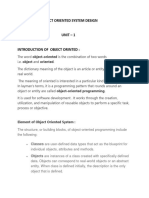0% found this document useful (0 votes)
220 views16 pagesJava Lab Manual (Aids)
Java lab experiments
Uploaded by
Vemula NareshCopyright
© © All Rights Reserved
We take content rights seriously. If you suspect this is your content, claim it here.
Available Formats
Download as DOCX, PDF, TXT or read online on Scribd
0% found this document useful (0 votes)
220 views16 pagesJava Lab Manual (Aids)
Java lab experiments
Uploaded by
Vemula NareshCopyright
© © All Rights Reserved
We take content rights seriously. If you suspect this is your content, claim it here.
Available Formats
Download as DOCX, PDF, TXT or read online on Scribd
/ 16

































































































